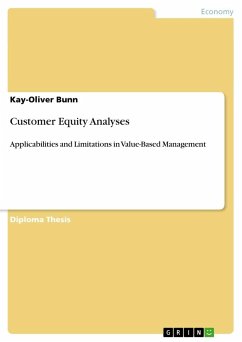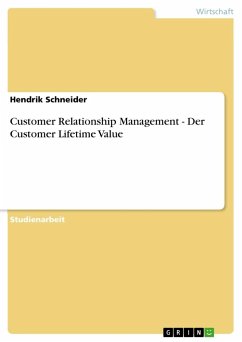Diploma Thesis from the year 2008 in the subject Business economics - Offline Marketing and Online Marketing, grade: 1,7, University of Applied Sciences Essen, language: English, abstract: Corporate management today is exposed to an area of conflict that allows only limited latitude. On the one hand, top management is regularly faced with the company owners' requests for an appropriate return on equity or Shareholder Value, a request that executives of public companies are mostly obliged to by contract: "Corporate Mission Statements proclaiming the responsibility of management is to maximize shareholder's total return via dividends and increases in the market price of the company's shares around." On the other hand, increasingly mature and well informed customers demand more and more customized goods for their individual requirements and are often known to change their buying behavior quickly. This behavior forces many organizations to an uncompromising orientation towards Customer Value, and a strict customer focus in both corporate planning and management, in order to further develop competitive advantages and to satisfy and retain valuable customers. This is particularly true for middle and lower management. Hence value creation for customers finds itself opposed to value creation for shareholders. A conflict that appears to find its resolution only in a consequent consideration of customer relationships as investment objects, whose continuation or intensification must be justified through an evaluation of economic efficiency. Against this background, systematic customer valuations become indispensable in order to obtain segmented and efficient market development and to enable a supplier to substantially ensure the availability of the critical resource customers. Based on the fundamentals of value-based management theory, value-based marketing and the reciprocal character of customer orientation, the author examines the coherence between Customer Equity and Shareholder Value and discusses how and to what extent it can become an appropriate management performance indicator for value-oriented customer relationship management. Furthermore, a selection of some of the most important monetary and non-monetary value potentials of customer relationships are characterized and interpreted. The author concludes with a critical discussion of the applicabilities and limitations of a wide array of uni-dimensional, multi-dimensional and process-oriented Customer Equity models that are suggested to give marketers and managers a better understanding of the fundamental question for the contributions of marketing to organizational performance.
Hinweis: Dieser Artikel kann nur an eine deutsche Lieferadresse ausgeliefert werden.
Hinweis: Dieser Artikel kann nur an eine deutsche Lieferadresse ausgeliefert werden.








